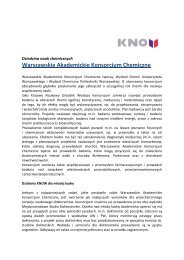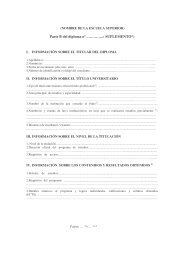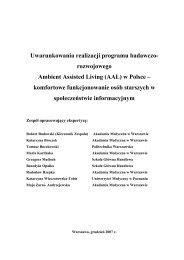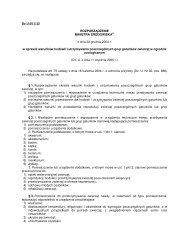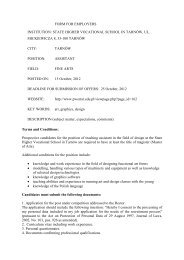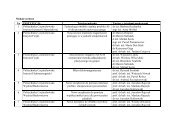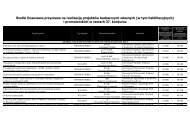Raport końcowy Modele zarządzania uczelniami w Polsce
Raport końcowy Modele zarządzania uczelniami w Polsce
Raport końcowy Modele zarządzania uczelniami w Polsce
Create successful ePaper yourself
Turn your PDF publications into a flip-book with our unique Google optimized e-Paper software.
<strong>Modele</strong> <strong>zarządzania</strong> <strong>uczelniami</strong> w <strong>Polsce</strong><br />
Projekt współfinansowany ze środków Unii Europejskiej w ramach Europejskiego Funduszu Społecznego<br />
programmes of studies without prior consent of the Ministry of Science and Higher Education<br />
(11.1).<br />
Thus, the amendments of the Law on Higher Education give HEIs much wider authority in<br />
shaping new programmes of studies, including the launching of totally new, unique programmes.<br />
At the same time the Law requires the senates of HEIs to define the effects of teaching precisely<br />
as well as the means of proving the achievements of these effects. Another important duty is to<br />
create and constantly improve institutional teaching quality assurance system. The legislator has<br />
not provided specific means for achieving quality assurance, leaving it to the autonomous<br />
decisions of HEIs. The only mandatory action is to monitor graduates’ careers (especially three<br />
and five years after graduation) to help to adjust offered programmes to the demands of job<br />
market (13a).<br />
Because of the changes of the Law on Higher Education (accompanied by necessary<br />
executive orders), the institutional management of the educational processes must adjust in:<br />
− planning (starting from the strategy of the whole HEI, strategies of basic organizational units<br />
that should follow national and regional strategies);<br />
− organizing (the implementation of National Qualification Frameworks for higher educations<br />
forces all programmes to readjust to new regulations; so all programmes should go through<br />
a substantial revision);<br />
− leadership/motivating (which includes a necessary process of constant adjustment to the<br />
needs of job market);<br />
− controlling (the creation and improving of institutional quality assurance system should be<br />
accompanied by some pro-quality initiatives).<br />
Because teaching is the most basic operation of any HEI, managing educational processes<br />
must be connected with other modules, including: research, human resources or capital<br />
improvements.<br />
Research process<br />
One of main objectives of recent changes in legislation is internationalization of scientific<br />
research in Poland and strengthening of its position in the world. It will depend on the level of<br />
preparation of Polish HEIs to conduct top research, the resources they will have at their disposal<br />
and their organizational performance.<br />
The efficient management of research activities implies taking into account several key<br />
factors, such as various sources of financing, interdisciplinary character of the majority of research<br />
topics, realization of research by multi-partner systems and consortia and necessity to fulfill more<br />
and more demanding and changing international standards.<br />
Realization of institutional strategy and attainment of assumed objectives demand in the<br />
above mentioned conditions require the existence of efficient organizational structures. Case<br />
studies of European research universities show that there exist highly specialized units dealing<br />
involved in all stages of research process - from project applications through their administration<br />
and reporting up to the valorization of project results. Another important issue is to ensure<br />
consistency of individual research activities with overall institutional strategy; the important role can<br />
be played by councils/committees including both top researchers from given institution and<br />
representatives of stakeholders (industry, social partners etc.).<br />
In the framework of the present Report a model of research management was elaborated.<br />
Two perspectives were taken into account: that of individual researcher/research group and the<br />
institutional one. Twelve sources of financing consistent with the present legislation were identified.<br />
All stages of project preparation and realization were presented. The necessity of taking into<br />
account both successes and failures related with grant applications was stressed. At the<br />
Centrum Badań nad Szkolnictwem Wyższym Uniwersytetu Jagiellońskiego<br />
31-007 Kraków, ul. Gołębia 24<br />
19




